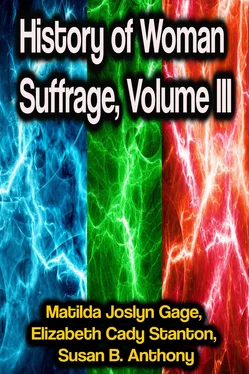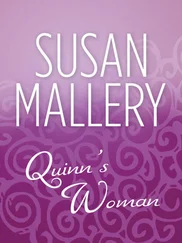Another class of thinkers, equally interested in woman's enfranchisement, maintain that there is, as yet, no power in the United States Constitution to protect the rights of all United States citizens, in all latitudes and longitudes, and in all conditions whatever. When the constitution was adopted, the fathers thought they had secured national unity. This was the opinion of Southern as well as Northern statesmen. It was supposed that the question of State rights was then forever settled. Hon. Charles Sumner, speaking on this point in the United States Senate, March 7, 1866, said the object of the constitution was to ordain, under the authority of the people, a national government possessing unity and power. The confederation had been merely an agreement "between the States," styled, "a league of firm friendship." Found to be feeble and inoperative through the pretension of State rights, it gave way to the constitution which, instead of a "league," created a "union," in the name of the people of the United States. Beginning with these inspiring and enacting words, "We, the people," it was popular and national. Here was no concession to State rights, but a recognition of the power of the people, from whom the constitution proceeded. The States are acknowledged; but they are all treated as component parts of the Union in which they are absorbed under the constitution, which is the supreme law. There is but one sovereignty, and that is the sovereignty of the United States. On this very account the adoption of the constitution was opposed by Patrick Henry and George Mason. The first exclaimed, "That this is a consolidated government is demonstrably clear; the question turns on that poor little thing, 'We, the people,' instead of the States." The second exclaimed, "Whether the constitution is good or bad, it is a national government, and no longer a confederation." But against this powerful opposition the constitution was adopted in the name of the people of the United States. Throughout the discussions, State rights was treated with little favor. Madison said: "The States are only political societies, and never possessed the right of sovereignty." Gerry said: "The States have only corporate rights." Wilson, the philanthropic member from Pennsylvania, afterward a learned Judge of the Supreme Court of the United States and author of the "Lectures on Law," said: "Will a regard to State rights justify the sacrifice of the rights of men? If we proceed on any other foundation than the last, our building will neither be solid nor lasting."
Those of us who understand the dignity, power and protection of the ballot, have steadily petitioned congress for the last ten years to secure to the women of the republic the exercise of their right to the elective franchise. We began by asking a sixteenth amendment to the national constitution. March 15, 1869, the Hon. George W. Julian submitted a joint resolution to congress, to enfranchise the women of the republic, by proposing a sixteenth amendment:
Article 16.—The right of suffrage in the United States shall be based on citizenship, and shall be regulated by Congress, and all citizens of the United States, whether native or naturalized, shall enjoy this right equally, without any distinction or discrimination whatever founded on sex.
While the discussion was pending for the emancipation and enfranchisement of the slaves of the South, and popular thought led back to the consideration of the fundamental principles of our government, it was clearly seen that all the arguments for the civil and political rights of the African race applied to women also. Seeing this, some Republicans stood ready to carry these principles to their logical results. Democrats, too, saw the drift of the argument, and though not in favor of extending suffrage to either black men, or women, yet, to embarrass Republican legislation, it was said, they proposed amendments for woman suffrage to all bills brought forward for enfranchising the negroes.
And thus, during the passage of the thirteenth, fourteenth and fifteenth amendments, and the District suffrage bill, the question of woman suffrage was often and ably discussed in the Senate and House, and received both Republican and Democratic votes in its favor. Many able lawyers and judges gave it as their opinion that women as well as Africans were enfranchised by the fourteenth and fifteenth Amendments. Accordingly, we abandoned, for the time being, our demand for a sixteenth amendment, and pleaded our right of suffrage, as already secured by the fourteenth amendment—the argument lying in a nut-shell. For if, as therein asserted, all persons born or naturalized in the United States are citizens of the United States; and if a citizen, according to the best authorities, is one possessed of all the rights and privileges of citizenship, namely, the right to make laws and choose lawmakers, women, being persons, must be citizens, and therefore entitled to the rights of citizenship, the chief of which is the right to vote.
Accordingly, women tested their right, registered and voted—the inspectors of election accepting the argument, for which inspectors and women alike were arrested, tried and punished; the courts deciding that although by the fourteenth amendment they were citizens, still, citizenship did not carry with it the right to vote. But granting the premise of the Supreme Court decision, "that the constitution does not confer suffrage on any one," then it inhered with the citizen before the constitution was framed. Our national life does not date from that instrument. The constitution is not the original declaration of rights. It was not framed until eleven years after our existence as a nation, nor fully ratified until nearly fourteen years after the inauguration of our national independence.
But however the letter and spirit of the constitution may be interpreted by the people, the judiciary of the nation has uniformly proved itself the echo of the party in power. When the slave power was dominant the Supreme Court decided that a black man was not a citizen, because he had not the right to vote; and when the constitution was so amended as to make all persons citizens, the same high tribunal decided that a woman, though a citizen, had not the right to vote. An African, by virtue of his United States citizenship, is declared, under recent amendments, a voter in every State of the Union; but when a woman, by virtue of her United States citizenship, applies to the Supreme Court for protection in the exercise of this same right, she is remanded to the State, by the unanimous decision of the nine judges on the bench, that "the Constitution of the United States does not confer the right of suffrage upon any one." Such vacillating interpretations of constitutional law must unsettle our faith in judicial authority, and undermine the liberties of the whole people. Seeing by these decisions of the courts that the theory of our government, the Declaration of Independence, and recent constitutional amendments, have no significance for woman, that all the grand principles of equality are glittering generalities for her, we must fall back once more to our former demand of a sixteenth amendment to the federal constitution, that, in clear, unmistakable language, shall declare the status of woman in this republic.
The Declaration of Independence struck a blow at every existent form of government by making the individual the source of all power. This is the sun, and the one central truth around which all genuine republics must keep their course or perish. National supremacy means something more than power to levy war, conclude peace, contract alliances, establish commerce. It means national protection and security in the exercise of the right of self-government, which comes alone by and through the use of the ballot. Women are the only class of citizens still wholly unrepresented in the government, and yet we possess every requisite qualification for voters in the United States. Women possess property and education; we take out naturalization-papers and passports and register ships. We preëmpt lands, pay taxes (women sometimes work out the road-tax with their own hands) and suffer for our own violation of laws. We are neither idiots, lunatics, nor criminals, and according to our State constitution lack but one qualification for voters, namely, sex, which is an insurmountable qualification, and therefore equivalent to a bill of attainder against one-half the people, a power neither the States nor the United States can legally exercise, being forbidden in article 1, sections 9, 10, of the constitution. Our rulers have the right to regulate the suffrage, but they cannot abolish it for any class of citizens, as has been done in the case of the women of this republic, without a direct violation of the fundamental law of the land. All concessions of privileges or redress of grievances are mockery for any class that have no voice in the laws, and law-makers; hence we demand the ballot, that scepter of power in our own hands, as the only sure protection for our rights of person and property under all conditions. If the few may grant and withhold rights at their pleasure, the many cannot be said to enjoy the blessings of self-government.
Читать дальше












